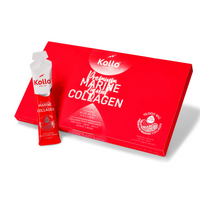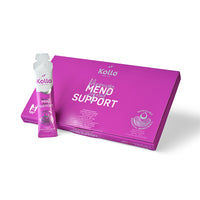Why do people recommend collagen for perimenopause?

Why do people recommend collagen for perimenopause?
The term ‘perimenopause’ means ‘around menopause’. It relates to the time in a woman’s life when her body makes the transition to menopause, which is the end of the reproductive years. Perimenopause comes at different ages for different women. The early signs may begin sometime in your forties, but some women begin to notice changes even in their mid-thirties.
During perimenopause, the level of oestrogen – which is the main female hormone – rises and falls unevenly. This can cause menstrual cycles to lengthen or shorten, and some menstrual cycles may fail to release an egg. The fluctuating hormone levels can also cause other symptoms of menopause, like sleep issues, hot flushes and vaginal dryness. This can be a difficult time for women, and there are lots of treatments available to ease the various symptoms when they arise.
One thing that is often recommended to help with menopause is collagen. This means collagen as a supplement, taken orally in the form of a liquid, powder or tablet. When you take this supplement, it supplies your body with the basic amino acids it needs to increase collagen synthesis in your system, addressing the problems associated with loss of collagen that comes with ageing and can be exacerbated by a number of lifestyle factors.
In this post, we will examine the benefits of collagen for perimenopause and help you assess whether it might be useful to you.
Common symptoms of perimenopause
As you move through the menopausal transition, you will encounter various changes in your body. Some will be subtle, and some will be a little more pronounced. You may experience:
Irregular periods
Ovulation becomes increasingly unpredictable, and you may experience a mix of longer and shorter spaces of time between periods. Your flow may be unusually light or heavy, and some periods may not happen at all.
Changes in mood
Perimenopause can lead to irritability and an increased risk of depression. The cause is often associated with sleep disruption, though the hormonal changes could also be a contributing factor.
Hot flushes and sleep disruption
Hot flushes are an extremely common symptom of perimenopause. This can often cause sleep problems due to night sweats, though sleep can sometimes be unpredictable even without hot flushes.
Declining collagen levels
The drop in oestrogen in your body can reduce its ability to synthesise collagen. This may cause the signs of ageing to accelerate – you might find skin loses elasticity, wrinkles form, nails become brittle and hair thins at a faster rate than before.
Loss of bone density
The declining oestrogen can also result in you losing bone faster than it can be replaced. This makes the bones more fragile and increases your risk of developing osteoporosis.
Increasing cholesterol levels
Another unwelcome side effect of the decline in oestrogen is that it may lead to unwanted changes in your blood cholesterol. If the presence of ‘bad’ cholesterol in your arteries increases, or the ‘good’ cholesterol levels drop, you could be at an increased risk of heart disease.
Collagen for perimenopause: how it can help
Many of the benefits of collagen supplementation can be particularly helpful for women during perimenopause. It can make a difference to many of the perimenopause symptoms that cause either discomfort or an increased risk of developing dangerous health conditions. Among the listed benefits of collagen supplementation, here are some of the things that might help:
• More collagen in the skin can help with skin elasticity, skin hydration and reducing the appearance of fine lines/wrinkles.
• Healthier skin means healthier hair and nails, since they grow from within the skin.
• Collagen is an important component of bone, so more of it in the body can help keep bone density at a healthy level.
• Collagen is known to have an impact on brain health and also metabolism, which can offer benefits to our emotional state and sleep quality.
• Collagen is known to be helpful for strengthening the arterial system.
• A collagen boost can help with comfort and suppleness in the joints as we age.
Collagen levels in the body naturally decline as we age. This only gets worse in midlife and, for women, the perimenopause can have a detrimental impact on collagen levels. Lifestyle factors that can cause collagen to decline faster include smoking, stress, excessive exposure to sunlight and bad diet.
Here are some specific ways you might benefit from taking collagen for perimenopause:
Mood regulation
As mentioned, collagen can be good for the health of your brain. Specifically, studies have shown that extracellular matrix proteins like collagen interact with cells directly via the cell surface receptors, promoting cellular growth in many parts of the body. The brain is one such area, so collagen may promote healthy maintenance and even regeneration of brain cells, which is great for mental health and may yield benefits with regards to mood swings commonly associated with perimenopause.
Promoting healthy sleep
Collagen is packed with the amino acid glycine, which is a known inhibitory neurotransmitter that calms the central nervous system. This can enable us to unwind, relax better and fall asleep more easily. Getting plenty of sleep is extremely important for your mental and physical health, and may lead to other health benefits for symptoms associated with perimenopause.
Boosting your endogenous collagen
As the oestrogen decline brought on by perimenopause can cause your natural collagen levels to decline, you may experience a wide range of issues relating to ageing. By delivering an abundance of the amino acids your body needs to produce collagen, in a highly bioavailable form, collagen supplements can help replenish your endogenous collagen to reduce and even reverse some of the signs of ageing. This can make you look and feel younger and healthier, thus boosting your confidence and generally improving your energy levels.
Bone density
Collagen is the primary constituent of bone mass. There have been many studies demonstrating that collagen peptides can increase the organic substance of bone. When perimenopause causes your bone mass to diminish faster than it can be replaced, you are at greater risk of chronic conditions like osteoporosis. Collagen supplements may help make up for this deficit, restoring bone density to a healthier level and protecting against the risks of frail bones.
Cholesterol
Collagen may not resolve the cholesterol issues that sometimes come from perimenopause, but it may be able to help strengthen your body against the risks. Collagen gives structure to your arteries and veins, and studies have shown that collagen supplements can maintain the suppleness of arteries and even help increase the levels of good cholesterol in your body. This, in turn, can reduce your risk of developing heart conditions.
The most bioavailable collagen for perimenopause
If you are taking collagen for perimenopause symptoms, you need it to be fast-acting, high-quality and effective. In other words, you need it to be highly bioavailable. What this means is that the collagen peptides in the supplement you take are easy for the body to absorb in large quantities. The collagen needs to be hydrolysed so that the large collagen molecules are broken down into smaller amino acid chains that are easy to absorb. You also need this hydrolysis process to have been carried out in a way that doesn’t harm the integrity of purity of the amino acids within. Additionally, you want to ensure the dosage of the collagen is high enough to deliver the benefits you aim to get from it.
Marine collagen is known to be the most bioavailable form of animal collagen, as opposed to bovine or porcine collagen. It is type I collagen, which is by far the most abundant in our bodies, and it closely mirrors the molecular structure of the collagen found in human bodies. Marine collagen comes from the skin and scales of fish, and it is the type of collagen that we put into every sachet of Kollo. Our collagen comes from aquaculture-farmed fish, so the animals are subjected to minimal toxins that might otherwise contaminate the all-important protein. That collagen is extracted using enzymatic processes so that no harmful chemicals interact with it, and the hydrolysis process used is very clean and efficient to maintain maximum purity and integrity of the resulting collagen peptides.
Other benefits of Kollo include:
• 10 grams of collagen peptides in every serving, which is enough to deliver on all the benefits associated with collagen supplementation.
• Suspended in a liquid form, further increasing the bioavailability of the collagen peptides.
• Fortified with B vitamins, vitamin C and l-lysine to strengthen your body’s uptake of the amino acids and ability to synthesise new collagen.
• Easy to incorporate into your daily routine: simply empty a sachet into water and mix for a delicious and highly nutritious daily serving of collagen.
Final thoughts on collagen for perimenopause
There can be many benefits to taking collagen for perimenopause symptoms. They generally relate to the issues around the fact that midlife and menopause cause our natural collagen levels to drop. Replenishing what you lose can help with these issues, but you will only achieve it by taking a high-quality collagen supplement that offers the necessary dosage of collagen peptides in a highly bioavailable form.
Kollo delivers exactly what you need. You can learn more about our product by exploring our blog section, reading our customer reviews and looking at the scientific studies into collagen supplementation. All this information can be found on our website, so we invite you to look around. And if you still have questions, please don’t hesitate to get in touch and someone from our team will endeavour to answer.

















